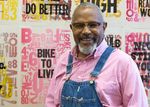QQUUAARRTTERERLLYY FALL 2020 - James Renwick Alliance - Arlington Public Art
←
→
Page content transcription
If your browser does not render page correctly, please read the page content below
DOCUMENTING HISTORY
ARTIST AMOS PAUL
KENNEDY JR. EXPLAINS
HIS PROJECT “THE
DESEGREGATION OF
ARLINGTON LUNCH
COUNTERS”
Jim Byers
Marketing director of Arlington Cultural Affairs
Artist Amos Paul Kennedy Jr., courtesy of the artist.
Over the last six and a half months, the COVID-19 Arlington Cultural Affairs, a division of Arlington
pandemic has challenged our creative communities Economic Development, delivers public activities
and disrupted age-old traditions of how we engage and programs as Arlington Arts. By creating,
with arts and culture. It also has presented new supporting, and promoting the arts, this initiative
opportunities. Such was the case on July 17 when the connects artists and community to reflect the
James Renwick Alliance and Arlington Arts partnered diversity of Arlington. For the last two years, Arlington
to host a virtual “Coffee & Conversation” with Arlington Arts has been collaborating with the county’s historic
Public Art’s visiting artist Amos Paul Kennedy Jr. preservation program and center for local history
to commemorate Arlington’s civil rights history. Our
Kennedy is an American printer, book artist and focus is the 60th anniversary of the desegregation
papermaker best known for social and political of Stratford Junior High School in 2019 and the 60th
commentary, particularly in printed posters. Kennedy anniversary of the lunch counter sit-ins that occurred
creates prints, posters and postcards from handset in June of this year. We have been working with
wood and metal type, oil-based inks and eco-friendly, Kennedy to bring attention to the places and events
affordable chipboard. The Economist noted that that are often overlooked in our collective memory of
Kennedy was “unafraid of asking uncomfortable Arlington.
questions about race and artistic pretension.”
“Arlington is still a very transient community, so
From an early age, Kennedy was interested in letters people don’t necessarily know the history of what
and books and studied calligraphy for several years. happened before,” commented Joan Mulholland, a
At the age of 40, he visited Colonial Williamsburg, nationally known civil rights activist, Freedom Rider,
Virginia and was mesmerized by an 18th-century and Arlington sit-ins participant, during the Zoom
print shop and book bindery demonstration. He “Coffee & Conversation” chat.
began studying printing at a community-based
letterpress shop in Chicago and, within a year, quit Since 2018, Kennedy has been visiting Arlington
his AT&T systems analyst job of two decades. He to meet community members, research history
continued his printmaking studies at the University of and create letterpress prints in response to his
Wisconsin–Madison under legendary book designer discoveries. He has prompted community members
Walter Hamady. Earning his MFA in 1997, Kennedy to make their own prints at events and festivals
subsequently taught graphic design at the Henry throughout the county. The program’s intention is
Radford Hope School of Fine Arts at Indiana University. for every person living and working in Arlington
In 2015, Kennedy was honored as a United States to receive or encounter one of Kennedy’s prints
Artists Glasgow Fellow in Crafts and received a to prompt their rediscovery of this part of the
8 $50,000 unrestricted prize. county’s history. Before the onset of the coronavirus,
Kennedy’s prints were available for free in the lobbyat the Ellen M. Bozman Government Center, the
seat of county government. This spring, a set of his
original prints was installed on an Arlington Transit
(ART) bus as part of its “Art on the ART” program.
“Taking something from an idea to a concept
enriches us,” Kennedy says. “The art carries a
little piece of your experience. I want everyone to
experience a little bit of that.”
While in-person interactions are now being
reimagined for 2021, the virtual ”Coffee &
Conversation” offered an opportunity for Kennedy
to engage with nearly 100 registered participants
from across the country to discuss the project and
the historic protests that challenged widespread Dion Diamond, an 18-year old Howard University student (center),
segregation policies and resulted in change. and Joan Mulholland, Arlington resident (on the left, leaning on
counter), during a sit-in demonstration in Arlington. DC Public
Library, Evening Star Collection © Washington Post, June 10,
Mulholland shared her firsthand accounts of the sit- 1960. Photo by Gene Abbott. Courtesy of Arlington Arts.
ins. “There were a lot more southern whites involved
in the movement than people realize,” mentioned
Mulholland, “but they were threatened, too … The
ones that I know were drawn by their religious faith.” seven sit-ins that occurred from June 9 to 22, 1960
with quotes from community members involved in
Kennedy is in the process of making 7,000 cards that the peaceful protests. This is one of the installations
will be distributed at Arlington Art Truck activations, and that is being rethought for 2021.
via special kiosks positioned near the sites of the former
drug stores where the lunch counter sit-ins occurred. “Printing is a very democratic process,” observed
Mr. Kennedy’s residency was to conclude by Kennedy. “You’re able to make multiple copies that
launching the spring 2020 season of interactive you can distribute to many people. They can take
art truck programming with the exhibition The copies home and share them. The Arlington project
Desegregation of Arlington Lunch Counters: 60th fell right into what I wanted to do: Get the public
Anniversary Tribute by Amos Paul Kennedy, Jr. In involved.”
partnership with The Black Heritage Museum of
Arlington, the program was designed to immerse
participants in the history of Arlington’s lunch counter
sit-ins by inviting them to collect letterpress cards
designed by Kennedy to commemorate each of the “Dignity” on chipboard by Amos Kennedy. Courtesy of Arlington Arts.
9You can also read





















































